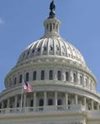
House Republicans passed their $15 billion rescission bill on June 7. The bill originated from a presidential rescission request released last month in which President Trump requested that Congress cut funding levels from previously unspent appropriations. Senate Republicans have until June 22 to pass a bill before its time to do so expires. The original $15.4 billion rescission request had included plans to cut $252 million in unspent 2015 Ebola response funding; however, the administration backpedaled and decided to keep in place the unspent funding to tackle the current crisis.
On June 14, the House Appropriations Committee released the text of the Labor, Health and Human Services (LHHS) bill. The House bill would increase funding for NIH by $1 billion, within NIAID by $107 million, at the Fogarty Center by $937,000, and within Biomedical Advanced Research and Development Authority (BARDA) by $50 million. The bill would keep funding level at the CDC Center for Global Health and National Center for Emerging and Zoonotic Infectious Diseases. It also contains a similar provision to the FY 2017 bill on an Infectious Diseases Rapid Response Reserve Fund that would be funded at $300 million. The House Appropriations Subcommittee will review the LHHS bill today.
The House State and Foreign Operations (SFOPs) subcommittee released and approved its version of a FY 2019 funding bill by voice vote, and it will now move on to a vote in the full committee. The bill contained level funding for global health programs at USAID, for HIV/AIDS under the Department of State and for the Global Fund. Ranking Member Nita Lowey (D-NY, 17th District) indicated that she would reserve amendments for the full committee hearing at a date to be announced. Text for the Senate bill has not been released yet; however the SFOPs bill will be reviewed next week.
The LHHS and SFOPs bills are the only remaining House bills to be approved by the Full Appropriations Committee. The Senate is expected to take up a minibus to minimize the size of a future omnibus. The Senate, per tradition, is moving at a slower pace and has yet to release the text for the LHHS or SFOPs bills. Senate Majority Leader Mitch McConnell also announced the cancelation of three weeks of the Senate’s month-long August recess due to "historic obstruction" by Democrats. He said senators will spend the time working to approve nominees and spending bills.
The Senate Armed Services Committee approved the National Defense Authorization Act (NDAA) out of Committee on May 24 and began consideration of the bill on Wednesday, June 13. The differences between the two chambers’ bills do not contain provisions related to global health research. The House National Defense Authorization Act (NDAA) passed the House on May 24. The bill process includes the opportunity for members to offer relevant amendments. For example, last year amendments were offered on tick-borne diseases as well as the process for developing the Zika virus. The tick-borne amendment was offered again by Rep. Bill Keating (D-MA), but did not garner enough support for inclusion in the final House bill.
Reauthorization of the Pandemic and All-Hazards Preparedness Act continues to progress. On June 6, the House Energy & Commerce Committee held a hearing on reauthorization efforts. Topics discussed during the hearing included infectious disease outbreaks, TB, AMR, BARDA and CARB-X, the Presidential Advisory Council on Combating Antibiotic-Resistant Bacteria, platform vaccine technology, the past and current Ebola outbreaks, as well as priority review vouchers and other private-sector incentives to encourage the production of medical countermeasures. On May 23, the Senate Health, Education, Labor and Pensions Committee passed their version of the bill out of Committee.